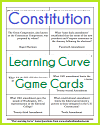Foundations of the American Government |
| www.studenthandouts.com > Social Studies > Civics > Foundations of the American Government |
 |
 |
|||||||||
| Federalist System Venn Diagram Worksheet | Constitution Game Question Cards |
|
Learning about the foundations of the United States government is important for American students for several compelling reasons:
Civic Education: Understanding the foundations of the U.S. government is a cornerstone of civic education. It prepares students to be informed and engaged citizens who can actively participate in the democratic process. Preservation of Democracy: A well-informed citizenry is essential for the preservation of democracy. An understanding of the principles and institutions of government allows citizens to make informed decisions, vote responsibly, and hold elected officials accountable. Understanding Rights and Freedoms: Knowledge of the Constitution and its amendments helps students appreciate the rights and freedoms enshrined in these documents, such as freedom of speech, religion, and assembly. It enables them to recognize when these rights are being threatened and to advocate for their preservation. Respect for Rule of Law: Learning about the foundations of government reinforces the principle of the rule of law. Students come to understand that everyone, including government officials, is subject to and accountable under the law. Cultural Identity: Knowledge of U.S. history and government is an integral part of American cultural identity. It connects individuals to their country's heritage, values, and democratic traditions. Appreciation of Diversity: Learning about the foundations of government includes an understanding of the struggles and movements that have shaped the nation, including the Civil Rights Movement, suffrage movements, and efforts to expand civil liberties. This fosters an appreciation for diversity and social progress. Critical Thinking Skills: Studying the foundations of government promotes critical thinking skills. Students learn to analyze historical events, evaluate government policies, and assess the impact of decisions made by elected officials. Problem-Solving Skills: Understanding the complexities of government and public policy equips students with problem-solving skills. They can engage in constructive dialogue and seek solutions to societal challenges. Global Awareness: In an increasingly interconnected world, knowledge of U.S. government is valuable for understanding the country's role in international affairs, diplomacy, and global governance. Active Citizenship: Learning about government encourages active citizenship. Students are more likely to engage in community service, advocacy, and volunteer work when they understand the importance of civic participation. Future Leadership: Education in government and civics nurtures future leaders and public servants. It prepares individuals for careers in government, law, public policy, and advocacy. Historical Perspective: Knowledge of government foundations provides a historical perspective on the evolution of the nation. It helps students appreciate how past decisions have shaped the present and can influence the future. Respect for Institutions: Understanding the functions and importance of government institutions fosters respect for the stability and continuity of these institutions, even during times of political disagreement. Responsibility: Learning about government instills a sense of responsibility for one's community and nation. Students recognize their role in shaping the future of the country. Civil Discourse: Education in government encourages civil discourse and respectful dialogue among citizens with differing viewpoints, promoting a healthier and more constructive political climate. In summary, learning about the foundations of the United States government is crucial for cultivating informed and engaged citizens who can actively participate in democracy, defend civil liberties, and contribute to the betterment of their communities and the nation as a whole. It equips individuals with the knowledge and skills needed to be responsible, active, and critical members of society. |
| www.studenthandouts.com > Social Studies > Civics > Foundations of the American Government |










